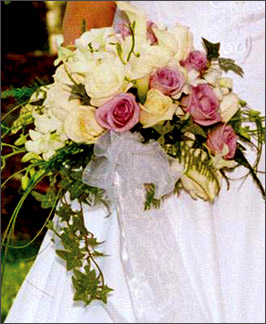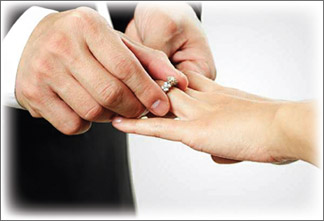|
Overcoming the name change dilemma:
To live happily ever after
Aditha Dissanayake
|
Think before you leap
Tammy Jo Eckhart hadn't planned on taking her husband's surname. But
when she got engaged, everyone around her expected that she would - and
those expectations angered her. Writing in Sister, Columbia University's
feminist magazine, she says:
"Surnames are one of the most powerful tools used by patriarchy to
deny women not only equal rights but even personhood.
It is promoted in all of our minds through...the attitudes of
government agencies and officials, not to mention our neighbors' and
families' reactions to those of us who have decided to buck tradition.
I'm afraid that women who change their names are blindly promoting
women as second-class persons, though I suspect that they themselves
don't think they are doing this.... To me the difference is whether the
woman thought about the choice - just blindly doing anything is not
acceptable." |
Swimming against the current
Julian Vicari (formerly Smith)
The decision to change my surname was solely my undertaking. The main
reason I considered changing my surname to my wife's was to do with the
fact that I love my wife more than anything in the world, I saw this
gesture of taking on her surname as a show of my love for her and would
carry on her family name as my father-in-law has two daughters. Also, I
quite liked the idea of breaking the normal tradition, doing something
almost unique.
My in-laws only found out I was changing it last week. Mainly because
right up to, and after, receiving the deed poll I was still unsure
whether I wanted to change my surname. In the end I just thought 'why
not', my reasons are very good. Although it has been strange - almost as
though I am turning into a different person. BBC |
In spite of the success of the feminist movement it is surprising
that the matter of changing the woman's last name after marriage, is yet
to become a significant cultural issue
 Everyone has their favourite pages in a newspaper. I confess every
Sunday, after glancing at the full page articles on the feature pages I
turn to the photo section and stare at the wedding photos of the son of
Mr and Mrs X tying the knot with the daughter of Mr and Mrs Y. I know
these pages are called 'the sports section' for women. Nothing could be
more annoying. Women read the (real) sports pages too. They know what a
hat-trick is, and the intricacies of the slip as well as the short and
long legs; they know if Mahela is in form or out, and the devastation
caused by Murali's deadly dusra. Everyone has their favourite pages in a newspaper. I confess every
Sunday, after glancing at the full page articles on the feature pages I
turn to the photo section and stare at the wedding photos of the son of
Mr and Mrs X tying the knot with the daughter of Mr and Mrs Y. I know
these pages are called 'the sports section' for women. Nothing could be
more annoying. Women read the (real) sports pages too. They know what a
hat-trick is, and the intricacies of the slip as well as the short and
long legs; they know if Mahela is in form or out, and the devastation
caused by Murali's deadly dusra.
Now that this misconception is out of the way, here comes the
explanation about my obsession with photos of weddings and parties where
well dressed couples pose for pictures often with a glass of something
or the other in their hands. I like to gaze at them and speculate if the
ladies in the pictures are the kind who would have kept their maiden
name even after they got married or if they would have become Mrs. so
and so the moment they signed on the dotted line. Staring at the bride I
wonder if she will be Mrs. X from now on or will she continue to keep
her maiden name and be called Ms. Y? The question is hard to answer.
What is harder though, is to keep a straight face when you think of this
name change tradition that comes in the wake of a wedding.
After all, if you illegally assume someone else's name, you are
accused for stealing another's identity; but when you legally assume
someone else's name, you're married.
That is, if you are a woman. Even though many an International
Women's Day has passed, the tradition of only the woman annihilating her
name after marriage remains unchanged. It is surprising that when our
society makes great efforts to eliminate violence against women which
includes physical violence against them in the confines of a marriage,
that this form of 'violence' is still prevalent and is not even
discouraged.
Surprising too that in these supposedly modern times when a woman
earns as much or even more than her husband, when she has proven herself
to be as capable as men in the political, intellectual and artistic
arenas, society should still practice such an oppressive tradition, a
tradition which seems patriarchal and signifies a change in 'ownership'
from father to husband.
Oppressive is perhaps too mild an adjective to describe this custom
which, it can be happily noted, is not practised in countries like
China, Spain and Korea. Changing your name is not easy. It means getting
a new identity card, passport, credit and library membership cards etc.
Yet, inconvenient and time consuming as this process might be, this is
nothing when compared to the psychological changes a woman has to
undergo when she has to accept a new married name as her true identity.
Changing the name stamped on your birth certificate after you get
married is surely like pressing the delete button on the 'woman that
was'. This tough psychological transition, which only women have to
undergo when they say 'I do' is surely unnecessary.
Especially when, for some women, particularly from strong family
backgrounds, their maiden name stands as a testament to generations of
ancestors who had proven themselves as worthy citizens, giving up their
name would mean turning their back on a prestigious linage.
As for women who have literally built names for themselves
professionally, a name change would be difficult or too costly for their
careers.
 Would Angelina Jolie have survived on the silver screen if she had
changed into Angelina Pitt after her marriage to Brad Pitt? Would you
have remembered Elizabeth Taylor if she had changed her name from Taylor
to Hilton to Todd to Burton, each of the eight times she got married? Would Angelina Jolie have survived on the silver screen if she had
changed into Angelina Pitt after her marriage to Brad Pitt? Would you
have remembered Elizabeth Taylor if she had changed her name from Taylor
to Hilton to Todd to Burton, each of the eight times she got married?
Your name is your identity. Why lose it? After all there are no laws
that demand you to change your name after you get married. It is no ones
business (except perhaps your husband's but chances are he would not
mind at all) whether you keep your maiden name or not, after marriage.
Even if your decision might be viewed as an unorthodox choice you can
find comfort in the fact that unorthodox does not mean bad or wrong or
illegal.
Moreover, life is easier if you decide to keep your maiden name.
There are no official forms that have to be filled out as you can
continue to keep your identity card and passport the way it is.
All you have to do is merely continue doing as you have always done,
calling yourself by your maiden name.
But, what about all those people who will suggest you are
emasculating your husband by keeping your name? Laugh them off. Surely,
your love for, and commitment to, your husband should in no way be
reflected in your choice of names.
So, stick to your guns. Stick to your maiden name. As Lucy Stone, the
lady who refused to take her husband's name when she married in 1855 and
campaigned for name choice freedom throughout her married life, said, "A
wife should no more take her husband's name than he should hers."
|



